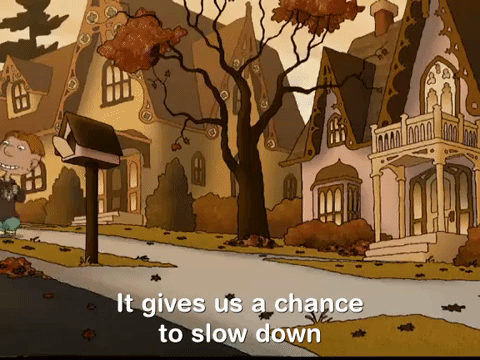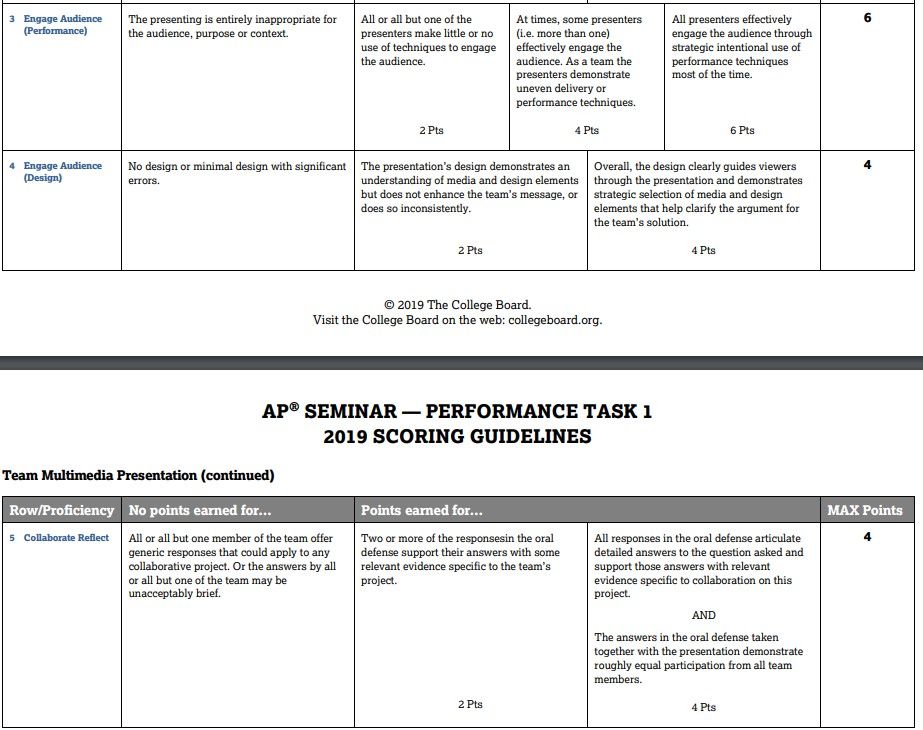Big Idea 5: Team, Transform, and Transmit
10 min read•june 18, 2024
Steven Kucklick
AP Seminar 💬
13 resourcesSee Units
It's time to team up for the last Big Idea!

Image Courtesy of Giphy
This last Big Idea is all about how to work productively with your team to create a polished finished project and present that to an audience.
Even though you will only be working with a team for Performance Task 1, you will still be using elements of Big Idea 5 in Performance Task 2 and all other work you do for Seminar.
Research Tip: It's easy to get hyper-focused on the Performance Tasks and forget about the other things that make up Seminar. The goal is not just to successfully complete PT 1 and PT 2, but to also learn and practice the skills that the Big Ideas are based around, for research you do in college and beyond!
There are two main groups that Big Idea 5 discusses: your audience 👨🏫 and your team. These are what the essential questions are based around and what we will be focusing on in this guide. Speaking of essential questions...
Essential Questions of Big Idea 5
The Essential Questions of Big Idea 5 are some of the most straight forward, but that does not mean we should spend less time looking at them.
- How can I best appeal to and engage my audience? 👨🏫
- What is the best medium or genre through which to engage my audience? ✍️
- What common misconceptions might my audience have? 🧐
- How might I adapt my argument for different audiences and situations? 👀
- How might I adapt my communication choices affect my credibility with my audience? 👨🎓
- What contributions can I offer to a team? 👍
- What is the benefit of revision? 😎
- How can I benefit from reflection on my own work? 🤔
It's easy to see how the two big topics for these essential questions are the audience and your team. Therefore, that is how we are going to break them up.
How to Engage Your Audience
Successfully engaging your audience is critical to 'sell them' 💰 on your topic and argument. Engaging your audience is not just about the language you are using, but also how you speak, how you design your presentation, and the way you structure your content. The first two EQs are focused on this idea.
Getting Your Audience to Understand You
The biggest thing to remember about audience engagement is that you know your topic, but you can't assume that your audience does. 🧐
Think critically about what needs to be explained or defined so that your audience is on the same page as you. The worst mistake you can make is confusing your audience. This can cause your audience to become totally lost, and not listen to what you're saying.

Image Courtesy of Giphy
The best way to fix this is to practice ✍️ your presentation (you're going to see this advice a lot in this unit guide...). You only have one chance to give your presentation to your teacher, but you have unlimited opportunities to practice it in front of other people! Watch their reactions; if a crowd is confused, it will generally show on their face. When you practice, you can also ask questions about your presentation.
Parents, other teachers, and even your own classmates can be valuable resources to help you tighten up and master your presentation. I'm sure you can even convince some friends to listen to a ten-minute presentation. (Hint: Free food is a powerful incentive.) Chances are if your friends don't understand your topic, you won't get max points.
How to Deliver a Presentation Well
Convincing an audience of your argument has just as much to do with your body language 💁 as it does with your data and evidence. Below is a list of things you should keep in mind while you are presenting to an audience.
- Speak loud and slow. If you feel like you're talking too slow, odds are that you are probably speaking at a good pace. 👨🏫
- Try to make eye contact with your audience regularly, but don't feel like you have to maintain eye contact throughout the entire presentation. 😎
- Body language says a lot about confidence. If you are able, stand up straight and keep your shoulders open.
- Also, make sure that you do not turn your back to the audience. You can reference something on your slides, but do not read directly from them. Same with notecards, if you decide to use them. 🤷♀️
- Do your best to enunciate your words and try not to mumble! 🤔
It's easy to get overwhelmed and nervous, but that's why it is so important to practice! A good tip is to practice in front of a mirror so you can get a sense of your facial expressions and how you are standing.
Research Tip: Some people find presentations harder than others. Know that is normal and valid!
How to Appeal to Your Audience
Essential Questions 3, 4, and 5 have you think about how well your presentation is catered to your audience. Knowing who makes up your audience is crucial to creating a convincing and effective presentation. Find out who your audience will be before you present. Is it just to your teacher? Is it your teacher, the principal, and a community member? These are all questions you can and should ask before you present. 🤔
Once you know your audience, here are some tips to cater your presentation to them:
- In AP Seminar, you should assume that your audience has very limited background knowledge about your subject, unless you know for a fact that the opposite is true.
- This means that you may have to define certain phrases or vocabulary words that you know by heart, but your audience might not, and you might have to present background information you wouldn't need to present to an expert in the field.
- Furthermore, think about any assumptions that your audience may have.
- Is your topic widely debated? Is it a hot button issue that your audience might have an opinion on?
- Do you challenge commonly held assumptions in your community? It's perfectly fine if you do, but if that's the case you may need to introduce more evidence and word your points carefully.
Being a Good Teammate
Group projects, the bane of our existence. However, in AP Seminar, you'll be working in a group for Performance Task 1; no way of getting around it!
I’m sure you've worked with a group in the past, and it went terribly. One person didn't do what they were supposed to, and the whole thing fell apart. We've all been there. But, I am going to tell you the secret to having a successful team. Are you ready??
COMMUNICATION!
That's right, it's that simple. Good communication will make or break a team. Here are a few to make sure that communication goes off without a hitch.
- Start by establishing group expectations and norms so that you're all on the same page from day 1! (How flexible are deadlines? How should we communicate with each other, and when?)
- If these norms need to change for any reason, don't be afraid to discuss with your group.
- Have a text message group so that you can quickly communicate with your teammates. 💻
- If your teammate makes a suggestion or a statement, make sure you respond to it to signify that you saw their message or heard them. 👍
- Check-in with your team at least every other day. You will be working on your Individual Research Report alone, but you should still keep your team in the loop. 🤔
- Do not make any major changes to your PowerPoint or script without talking to your team first. ✍️
- If someone in your team isn't doing what they are supposed to be doing, do not accuse them or pass blame. Ask them if they need help or are having problems. Passing blame can often lead to fights.
- Websites like Slack, Notion, and Trello make working in a group SO MUCH EASIER. Google Docs is great, as well, but can be super messy. Just find a website and program that works for you! 👀
- When in doubt, talk it out! You will get nowhere if you bottle up concerns or questions. 🗣️
- Worst case worst: Don't forget that this is a team you're in for at most, a school year.
- If things are truly dire, or if you just need help managing something you can't figure out on your own, you can always go to your teacher as well. 👨🏫
Working in a team can be very challenging, but guess what? You will be doing it the rest of your life! Most jobs require some level of team and employers want to hire people who have good teamwork skills. Work on these skills and I promise you will see success.
Self Reflection
The last aspect of Big Idea 5 is one of the most important: reflection. This idea is all about thinking about what you did right, what you did wrong, and what you would do differently in the future. 🤔
As you work through all of your practice and your Performance Tasks, you should be practicing self reflection. This might seem easy, but the hard part is accepting your reflections and making changes based on them.

Image Courtesy of Giphy
This reflection can be done in a lot of different ways.
- You can meditate for five minutes at the end of the week, reflecting on what you did right and what you would like to change.
- You can keep notes that you take as you're working.
- You can meet with your teammates and your teachers to talk about the work you've done.
As long as you're reflecting, you're doing what you need to do. 👍
Make sure that you are working to change and adapt to the mistakes that you make along the way. Reflecting is great, but it doesn't do much if you don't make changes! You don't have to change yourself overnight, of course, but keeping in mind how you'd like to improve your work/team relationships/etc is a positive life skill.
Furthermore, there will be reflection questions in the AP Exam, as we'll discuss in the next section.
How Big Idea 5 Relates to the Exam
Big Idea 5 mostly shows up in the presentation sections of the two Performance Tasks. Let's take a look at the rubrics.
Performance Task 1

Source: College Board Rubrics
Looking at the rubric above we can see that 14 points are devoted to Big Idea 5. The first two rows are all about how you engage your audience. Make sure that you are using the tips that I listed above to achieve all six points.
Once you are done with your presentation each team member will have to answer a question relating to the presentation or the research process.
PT1 Question Examples
Examples of these questions can be found in the Course and Exam Description on page 48:
- Student A, how did the group decide to include Student B’s perspective/lens/conclusions into the overall presentation?
- Student A, give one specific way that your thinking changed as a result of learning about Student B’s findings.
- Reflecting on your colleagues’ work, which one had the greatest impact on your overall understanding of the problem your group identified?
- What is an example of a compelling argument from one of your peer’s individual reports that you decided to exclude from your team presentation and why?
- What is a way in which your team’s resolution makes you think differently about your own individual research?
- Describe an argument from one of your peer’s individual reports that made you think differently about your team’s solution or conclusion?
- If you had another team member, what other perspectives or limitations could they have researched that would have made a useful contribution to the project?
The answers to these questions need to be specific and can't just be general statements.
Performance Task 2


PT 2 uses Big Idea 5 in a very similar way as PT 1. The main difference that we need to note is that the Oral Defense is a little more complex. You will be answering two questions that, again, you need to answer with specific evidence.
PT2 Question Examples
Oral defense questions can be found in the Course and Exam Description on page 52. They'll cover two topics: Reflection on the Research Process and Extending Argumentation through effective questioning and inquiry.
- How did some preliminary information you gathered inform your research?
- What evidence did you gather that you didn’t include? Why did you choose not to include it?
- How did your research question evolve as you moved through the research process?
- Did your research go in a different direction than you originally expected?
- What information did you need that you weren’t able to find or locate?
- How did you approach and synthesize the differing perspectives in order to reach a conclusion?
- What additional questions emerged from your research? Why are these questions important?
- What are the implications of your findings to your community?
- How is your conclusion in conversation with the body of literature or other research sources you examined?
- How did you use the conclusions or questions of others to advance your own research?
Research Tip: If you can, preparing responses to the questions for both of the Performance Tasks can make answering the questions the day of much easier. You don't have to write out full sentence responses: even bullet points can help!
In Conclusion
Big Idea 5 covers the stuff that helps PT 1 and PT 2 run smoothly. It may seem like small potatoes compared to the other Big Ideas, but don't count it out! If your team isn't operating at its best, the rest of PT 1 will fall apart. If you aren't reflecting on the mistakes you made, you won't improve. Plus, you will use the ideas in Big Idea 5 in other aspects of life! 😎
Browse Study Guides By Unit
🤨Big Idea 1: Question and Explore
🧐Big Idea 2: Understand and Analyze
👥Big Idea 3: Evaluate Multiple Perspectives
💡Big Idea 4: Synthesize Ideas
🗣Big Idea 5: Team, Transform, and Transmit
✏️Frequently Asked Questions
📚Study Tools
🧐Exam Skills

Fiveable
Resources
© 2025 Fiveable Inc. All rights reserved.